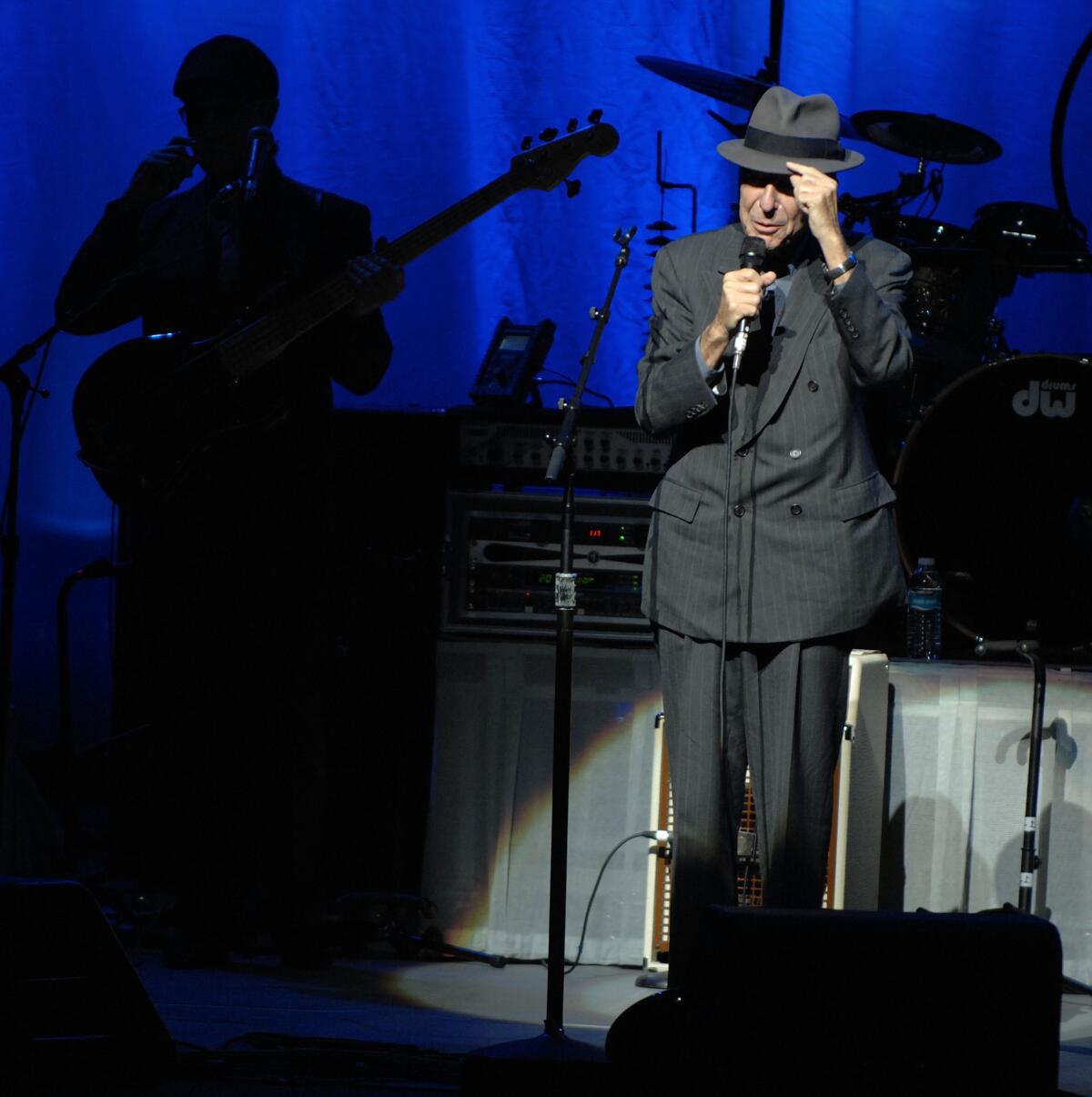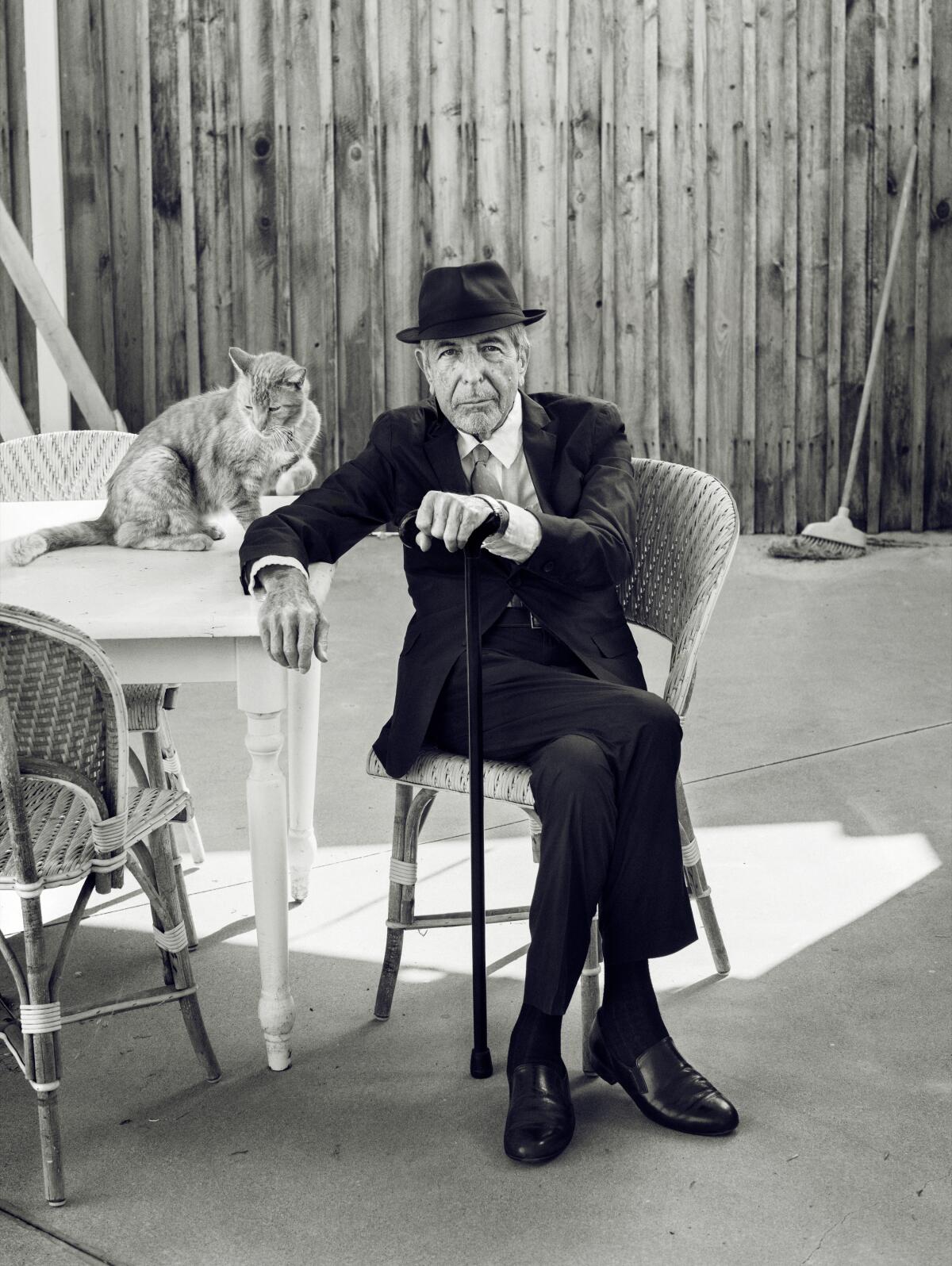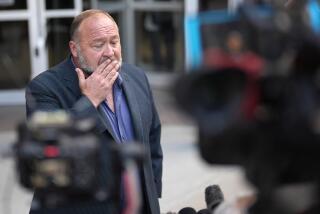Leonard Cohen’s estate sues onetime attorneys for malpractice, citing fraud and forgery

- Share via
- In 2022, Cohen’s children successfully sued to remove Robert Kory, the late singer’s manager, as trustee of Cohen’s estate. They alleged he seized control of the trust to “pilfer” Cohen’s $50-million fortune, which he denied.
- Now the “Hallelujah” singer’s estate is suing the law firm that handled the trust, alleging in a lawsuit it enabled Kory to “abuse” and “siphon” the trust’s assets unchecked.
In 2008, acclaimed singer-songwriter Leonard Cohen staged a surprising comeback. At the age of 73, he embarked on a five-year world tour in order to replenish his coffers after his former manager was accused of embezzling millions from him, leaving him nearly broke.
Often wearing his signature bolo tie and fedora, he performed three-hour sets to sold-out crowds filled with rapturous audiences, many of whom were discovering the enigmatic poet for the first time.
But Cohen’s late-in-life triumph didn’t have a happy ending. A lawsuit filed in Los Angeles Superior Court last week alleges that Cohen’s longtime law firm covered up “malfeasance” by another former manager — the same person who helped support his comeback tour.
The dispute highlights allegations of the vulnerabilities that artists face when they entrust their business affairs to managers and others.
Leonard Cohen, a singer-songwriter whose literary sensibility and elegant dissections of desire made him one of popular music’s most influential and admired figures for four decades, has died.
The latest tussle over Cohen’s estate began in 2022, when Cohen’s children Adam and Lorca Cohen successfully sued to remove Robert Kory, the singer’s manager, from his role as trustee. The children had accused Kory in that suit of installing himself as the sole trustee of Cohen’s estate, as well as other breaches of fiduciary duty that they said allowed Kory to “seize” control of the trust and “pilfer” Cohen’s $50-million fortune.
Kory refuted the claims, saying in a cross-complaint that he had “expressly followed the wishes of Leonard Cohen, and worked hard, diligently and successfully to make Tens of Millions of Dollars” for his heirs.
The lawsuit filed last week paints a different picture. It alleges that a former partner with Beverly Hills-based Ervin Cohen & Jessup (ECJ) forged documents that allowed Kory to be named trustee against Cohen’s wishes, enabling him to “abuse” and “siphon” the trust’s assets unchecked, and the firm “then covered it up for years.”
“As an artist [Cohen] depended on his lawyers to protect his family’s interests and they failed in that task,” said John Rushing, an attorney representing the trust, echoing claims in the lawsuit.
Representatives of Ervin Cohen & Jessup did not respond to requests for comment.
‘This is our Shelley, this is our Byron’
The Montreal-born Cohen had forged an uncommon musical career that spanned nearly five decades, exploring a range of themes often as a meditation on the human condition in spare, sophisticated, sometimes mysterious language.
“This is our Shelley, this is our Byron,” was how Bono, the lead singer of U2, described Cohen in the 2005 documentary “Leonard Cohen: I’m Your Man.”
Cohen’s mother, a nurse, encouraged his interest in poetry. Cohen didn’t begin his musical career until 1966. However, many of his best-known songs only became popular after others recorded them, including “Suzanne,” which became a hit for Judy Collins.
“Hallelujah,” his sublimely soaring ballad, was originally rejected by his record company, which didn’t see any commercial value in it, in 1984. Ten years later, Jeff Buckley recorded a version that became a force. The song now is considered a classic, and hundreds of artists including Bob Dylan have performed it.
In 2005, Cohen, who had studied Zen Buddhism for years, had retired from music — he had lived for a time at a monastery in Mount Baldy — when he accused his then-manager and onetime paramour, a woman named Kelley Lynch, of embezzling more than $5 million from his retirement funds and investments, leaving him with just $150,000 and facing millions in potential tax liabilities.
A Los Angeles Superior Court judge granted Cohen a default judgment of $9.5 million after Lynch failed to appear. While the singer never recovered the money, Lynch was sentenced to 18 months in jail in 2012 for violating a restraining order against Cohen and others to whom she sent thousands of harassing emails and voice messages.
“It gives me no pleasure to see my onetime friend shackled to a chair in a court of law, her considerable gifts bent to the service of darkness, deceit and revenge,” said Cohen during his witness statement.
The end of this ordeal, however, set the stage for what happened next.
Staging a comeback at 73
Kory, an attorney who represented Cohen in the Lynch litigation, had since also become his manager.
Finding himself in a deep financial hole, Cohen was forced to go back on the road for the first time in 15 years.
“Leonard was very reluctant at first. From his view, touring had always been a disaster — he would say, ‘Performing is an opportunity for a thousand humiliations,’” Kory told Billboard.
The tour received a rapturous response. It was a critical, commercial and personal triumph.

Between 2008 and 2010 alone, Cohen played 147 dates in North America, Europe and Australia, grossing $85.7 million, according to Billboard Boxscore.
The tour invigorated Cohen with renewed purpose. “Being back on the road reestablished me as a worker in the world,” he said.
The same year that he went back on tour, Cohen was inducted into the Rock and Roll Hall of Fame. “We are so lucky to be alive at the same time Leonard Cohen is,” said Lou Reed in his introduction.
During his comeback, Cohen recorded new music, including his 14th studio album, “You Want It Darker.” His son Adam, who also produced it, said his father considered it to be “one of his greatest records.”
‘Replacing one unscrupulous manager with another’
It was during this time, Cohen’s children said, that Kory exerted more influence and control in their father’s business affairs, charging “exorbitant sums for work performed by a web of entities he controlled,” according to the lawsuit, with Kory “replacing one unscrupulous manager with another.”
In 2010, according to the recent lawsuit, Cohen “purportedly” amended the trust, replacing his children and Anjani Thomas, his former partner, and naming Kory as the sole successor trustee.
However, on several occasions, Cohen’s family raised their concerns about Kory’s role, the lawsuit states.
Kory did not respond to requests for comment.
In 2013, Cohen’s son Adam told his father that he had discovered that Kory was “mismanaging” the family’s investment accounts, “arranging them with an unusually high fee structure,” according to the lawsuit. In the complaint he also said he found the business manager to be inattentive with their “investment strategies” and noted the “lack of transparency in the statements.”
Cohen appeared to share his son’s concerns, writing to him, “As you know, I have not been pleased for a long time... can’t do much from out here but we have to restructure the whole arrangement of our business affairs.”
In another email cited in the suit, the singer wrote to his manager complaining that since Kory had attached Cohen’s company to his personal American Express card, “The situation has been opaque.”
By early 2016, Cohen revoked his 2010 decision to make Kory the estate’s trustee and reinstated his children, Adam and Lorca Cohen, as well as Anjani Thomas, as successor trustees, according to the suit.
In October, Cohen wrote to Kory telling him that he found the situation to be “out of control” and pressed him to detail his finances, asking him how much money was coming in and how much was going out. He also cited a “$750,000 bonus” paid to Kory’s wife, “which you engineered,” according to an email cited in the lawsuit.
“People with whom I’ve discussed my business arrangements, they all usually exclaim: you must be crazy, Leonard! after all you’ve been through, you’ve put all your financial affairs in the hands of one man, with no checks and balances, no oversight, and no financial reports that’s pushing trust and temptation into a dangerous area,” Cohen said in the email.
A month later, Cohen died in his sleep after a fall. He was 82.
At the time of his death, he left an estate worth an estimated $50 million.

Despite Cohen’s reinstatement of his children and Thomas as his trustees, Kory continued on as the sole trustee and following Cohen’s death, “Self-dealing followed,” states the complaint.
Between 2018 and 2023, the suit alleges that Kory charged the trust an estimated $18.2 million, paying himself, his businesses and family members. The expenses included $650,000 in rent for his law offices and car expenses; $6.1 million in bookkeeping, management and legal fees; and a first-class trip to South Africa that Kory took with his wife to view the Mandela archives, the lawsuit states.
In 2022, Kory retained his firm, RK Management, as a broker to sell Cohen’s music catalog to Hipgnosis, a music rights investment and management company, collecting a $7-million commission, according to the suit, which adds that Kory “did not explore any potential outside brokers.”
Further, the family alleged in the suit the trust’s law firm, Ervin Cohen & Jessup, “never advised Kory (or the beneficiaries)” that by hiring his own companies to work for the trust without seeking a competitive bidding process, Kory “may be self-dealing and ought to seek the beneficiaries’ informed consent.”
That same year, Cohen’s heirs filed a probate petition to remove Kory as trustee and to compel him to turn over the estate’s assets and return the money he garnered while acting as trustee.
The recent lawsuit cites a deposition from February 2023 in which Reeve Chudd, then a partner at ECJ, admitted under oath to removing a page from Cohen’s signed trust after his death and replacing it with one naming Kory as the primary trustee.
Despite Chudd’s admission, ECJ called Kory’s removal from the trust a “scrivener’s error” and “continued insisting that Kory was the rightful trustee,” while “turning a blind eye to Kory’s self-dealing and covering up its own wrongdoing,” earning $2.6 million in legal fees from the trust, according to the suit.
The probate court removed Kory as trustee in 2023.
Chudd is no longer listed as an attorney on ECJ‘s website. He has been ineligible to practice law in California since 2024, according to the California state bar, citing his noncompliance in reporting data about his client trust accounts.
The legal saga playing out is now part of Cohen’s legacy. But as Cohen once wrote: “I don’t consider myself a pessimist. I think of a pessimist as someone who is waiting for it to rain. And I feel soaked to the skin.”
More to Read
Inside the business of entertainment
The Wide Shot brings you news, analysis and insights on everything from streaming wars to production — and what it all means for the future.
You may occasionally receive promotional content from the Los Angeles Times.










